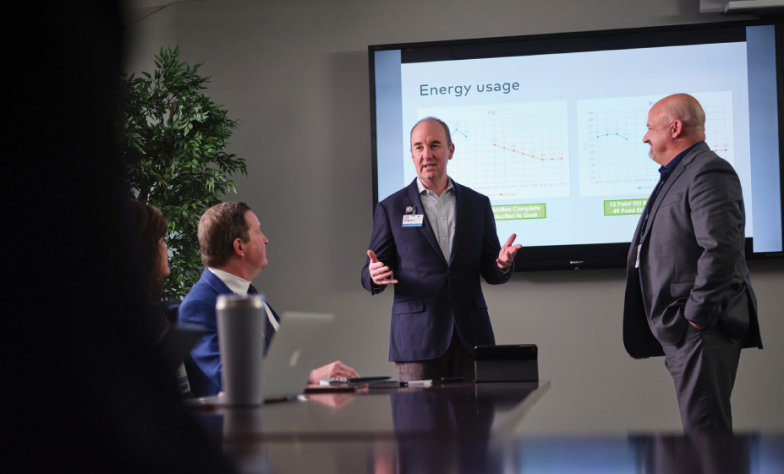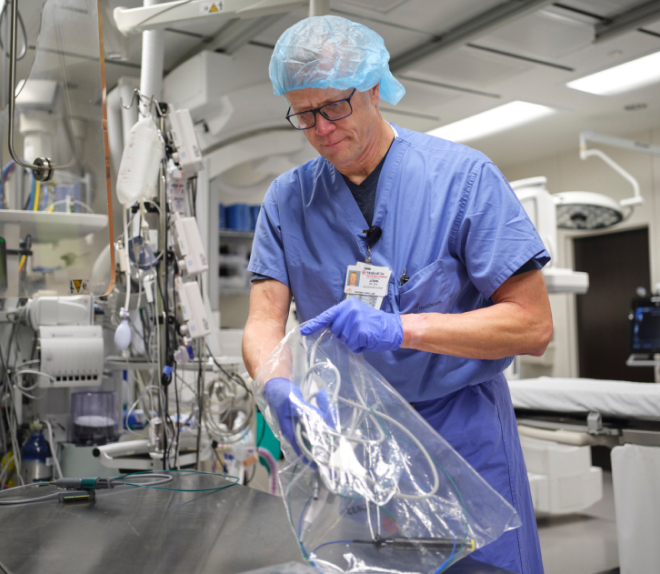Environmental sustainability
HCA Healthcare’s dedication to improving more lives in more ways is directly connected to the impact we have on the environment, as well as our understanding of how the environment impacts overall health and well-being. Our environmental strategy includes short- and long-term sustainability plans, and centers on incorporating the following four key pillars into our operations:
Managing energy and water responsibly by striving to reduce use of energy and water, decarbonize energy and manage water quality.
Enhancing climate resilience by working to ensure HCA Healthcare’s operations and the communities we serve are more resilient to climate risks.
Sourcing and consuming efficiently by focusing on decreasing emissions from purchased goods, sourcing responsibly, reducing consumption and reusing where possible.
Managing the environmental impact of our capital programs by trying to reduce carbon emissions, waste and other adverse environmental impacts from new construction, retrofits and expansions.


Director of Facility Management; Continental Division
Establishing the blueprint for improving energy efficiency through utility partnership
After some of the largest wildfires ever recorded in Colorado occurred in 2020 and the effects of heavy smoke lingered in Denver’s atmosphere, the Facility Operations team at HealthONE in HCA Healthcare’s Continental Division took action to find more sustainable solutions.
Their goal: to identify ways HealthONE hospitals could do more to reduce their carbon emissions, better manage electricity usage and contribute to a healthier environment for Rocky Mountain region residents. One of their first steps was to call their local electricity vendor, Xcel Energy.
Listen to Continental Division’s Kevin Kucera, director of real estate, share about the start of HealthONE’s partnership with Xcel Energy.
“We called our local electricity vendor and engaged with them on a strategic energy management program for the Denver market,” said Andy Draper, chief information officer (CIO) at HCA Healthcare Continental Division.
HealthONE and Xcel Energy partnered to launch a pilot of the Strategic Energy Management (SEM) program in 2020. Funded by Xcel Energy, the SEM program is a holistic approach to managing industrial and commercial energy use. By integrating energy management into business practices, the program provides businesses with a clear pathway to improving energy performance and operational efficiency.
Managing and reducing the energy use of facilities with 24/7 operations requires a different approach than standard office buildings. Through the SEM program, HealthONE is taking the lead in creating hospital-based groups, benchmarks and goals to establish an approach for other divisions and teams to follow. Working with SEM’s dedicated consulting team, HealthONE’s facility management teams continuously look for ways to help reduce energy usage at all HealthONE facilities. SEM consultants also provide guidance for how to apply for rebates, so our engineers can focus on energy-efficiency improvements.
“We’re all in this collaborative mode where we’re learning alongside the utility and they’re learning from us,” said Chris Talbert, AVP of capital project delivery at HCA Healthcare.

~$800,000
in electricity costs saved by HealthONE in 2022
Led by Continental Division’s Kevin Kucera, director of real estate, and Dennis Clair, director of facility management, the Facilities Management team’s approach at HealthONE has ranged from replacing boilers, reducing the energy use of chillers and managing electricity usage to adjusting variable frequency drives (VFD) to help optimize the HVAC systems at hospitals.
“Our teams work together to stay informed and provide the SEM consultants with the information they need,” said Kevin.
The team credits deep collaboration across HCA Healthcare and with Xcel Energy as one of the main contributing factors for the progress in energy reductions, which is timely as the City of Denver and Colorado have established energy performance targets and legislation. In 2022, the City of Denver approved an ordinance, called Energize Denver, requiring all commercial and multifamily buildings to reduce greenhouse gas emissions (GHG) by improving energy efficiency, utilizing renewable energy and electrifying buildings.
“Part of the success has been the communication between our groups within HCA Healthcare,” said Dennis. “We’ve been able to really come together and work together to try and save energy and money at the same time.”
Listen to Andy Draper, Continental Division’s chief information officer (CIO), share about HCA Healthcare’s support and resources, and the collaborations that have contributed to the program’s success.
Moving forward, the team will strive to share learnings with other HCA Healthcare divisions so they can also achieve savings by engaging local utilities and learning what steps they can take to reduce energy and ultimately create a better environment for their communities.
Listen to Continental Division’s Dennis Clair, director of facility management, share why communication is key and his advice for other divisions.
793K+
pounds of devices diverted from landfills for reprocessing
34.12M+
pounds of construction waste recycled
30.4M+
pounds of shredded paper diverted from landfills for recycling
23.6M+
pounds of waste diverted from landfills for recycling